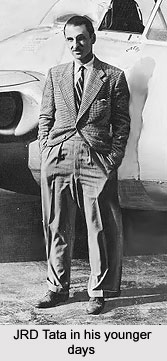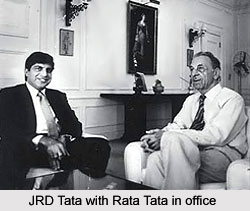 J.R.D Tata, properly known as Jehangir Ratanji Dadabhoy Tata, was one of the most significant and noteworthy businessmen of India. He was also a pioneer aviator as well, who was honoured the Bharat Ratna, nation`s highest civilian award, in the year 1992. J.R.D Tata was also bestowed with the Legion of Honour by the French government in the year 1954. He believed that leadership meant motivating others.
J.R.D Tata, properly known as Jehangir Ratanji Dadabhoy Tata, was one of the most significant and noteworthy businessmen of India. He was also a pioneer aviator as well, who was honoured the Bharat Ratna, nation`s highest civilian award, in the year 1992. J.R.D Tata was also bestowed with the Legion of Honour by the French government in the year 1954. He believed that leadership meant motivating others.
J.R.D Tata had served as the chairman of Tata and Sons. He became the fourth Chairman of the Tata Group at the young age of 34 only and is undoubtedly credited with placing the Tata Group on the international map.
He led the company to become one of the Industrials groups around the globe. J.R.D Tata was India`s most well known industrialist, widely respected for his enormous contribution to the development of Indian industry and aviation in particular. Tata headed India`s largest industrial conglomerate with uncommon success. He represented a lofty idea of Indian-ness coupled with high ethics. Compassionate at heart JRD Tata is recognized as the most enterprising Indian entrepreneurs of all times.
Early Life of J.R.D Tata
Jehangir Ratanji Dadabhoy Tata was born on 29th July 1904 in Paris. The second child was born to Ratanji Dadabhoy Tata and his French wife Suzanne Briere. He was educated in France, Japan and England. He also attended the Cathedral and John Connon School in Bombay (Mumbai), before being drafted into the French Foreign Legion for a mandatory one-year period. J.R.D wanted to extend his service in the forces but eventually he had to leave.
Career of J.R.D Tata
In 1925, J.R.D Tata joined Tata and Sons as an unpaid apprentice. As he had great interest in flying, Tata passed the pilot`s examination on February 10, 1929, and became the first Indian Pilot. With this distinctive honour of being India`s first pilot, he played an instrumental role in developing civil aviation in India by establishing Tata Airlines, in the year 1932, which ultimately became Air India in 1946. He was rightfully called the Father of Indian Civil Aviation. He is credited with bringing commercial aviation to India. JRD went on to establish Air-India International in 1948.
There he became the president of International Air Transport Association (IATA) within 10 years of its establishment. Till 1978 he retained a high position in Air India and developed it as one of the most efficient airlines in the global scenario. JRD joined the Tatas as an unpaid apprentice in December 1925. His mentor in business was John Peterson, a Scotsman who had joined the Group after serving in the Indian Civil Service. However, at 22, his father passed away. He was selected as the Chairman of Tata and Sons in 1938, at the age of 34. Tata managed the Tata Group of companies, which diversified into Engineering, Steel, Power, Hospitality and Chemicals. He established 14 different enterprises under his leadership when he started, which ultimately resulted in a group of 95 enterprises, when he left in 1988. J.R.D Tata was well respected and renowned for upholding high ethical standards in his organisations. Under his management and chairmanship, the Tata Group grew manifold.
 J.R.D Tata also became the trustee of Sir Dorabji Tata Trust from its commencement in the year 1932. Under his leadership, the Trust founded the Tata Memorial Center for Cancer Research and Treatment, which was Asia`s first cancer hospital, in Mumbai in the year 1941. Tata Institute of Fundamental Research, The Tata Institute of Social Sciences, and The National Center for Performing Arts were also formed later under the guidance of J.R.D T Tata.
J.R.D Tata also became the trustee of Sir Dorabji Tata Trust from its commencement in the year 1932. Under his leadership, the Trust founded the Tata Memorial Center for Cancer Research and Treatment, which was Asia`s first cancer hospital, in Mumbai in the year 1941. Tata Institute of Fundamental Research, The Tata Institute of Social Sciences, and The National Center for Performing Arts were also formed later under the guidance of J.R.D T Tata.
In the year 1945, J.R.D Tata established Tata Motors. J.R.D Tata founded Air India International in the following year, in 1948, which was the first international airline of the country. Tata instigated a program of Employee Association with Management, to increase participation of the employees in the enterprise. He advocated the ideas of an eight-hour working day, workers` provident scheme, workmen`s accident compensation schemes and free medical aid to improve employee welfare in India.
The Tata Consultancy Services was also established under the management of J.R.D Tata in 1968. The Tata group, supported by J.R.D T Tata, also increased its responsibility towards the workers by initiating a new programme, where the employees were considered to be at work while they were in transit during coming to work and returning from work. This increased the financial liability of the company towards its employees, in case of any mishap in transit. The Titan Industries where founded in the year 1987.
The period from 1964 to 1991 severe government controls on big businesses again curbed the growth of the Tata Group. Analysing his own performance, J.R.D Tata insisted that his only real contribution to the group of companies was Air India. For the rest, he generously gave credit to his executives. He has also been a vital bridge between the scientific establishment and the government through his founding of the Tata Institute of Fundamental Research, and as the longest serving member of the Atomic Energy Commission. Tata`s personal interest in technology, spurred several group companies, particularly Tata Steel and Tata Chemicals, to innovate in their fields.
During the last half of the 20th century, Tata entered several new businesses and produced a vast range of products, from trucks to locomotives, airlines to hotels, financial services, soda ash and other heavy chemicals to pharmaceuticals, air conditioning to lipsticks, cologne and tea. As an industrialist, J.R.D Tata is credited with placing the Tata Group on the international map.
Achievements of J.R.D Tata
J.R.D Tata received the Padma Vibhushan in 1957 on the eve of silver jubilee of Air India. He was bestowed with the Legion of Honour by the French government in the year 1954. For his crowning achievements in aviation, J.R.D Tata was bestowed with the title of Honorary Air Commodore of India. He also received the Guggenheim Medal for Aviation in 1988. In 1992, because of his selfless humanitarian endeavours, J.R.D Tata was awarded India`s highest civilian honour, the Bharat Ratna. In the same year, J.R.D Tata was also bestowed with the United Nations Population Award for successfully implementing the family planning movement in India.
J.R.D Tata died on 29th November 1993, at the age of 89. He was in Geneva, Switzerland, at the time of his death. On his death, the Indian Parliament was adjourned in his memory, an honour not usually given to personalities who are not Members of Parliament.




















